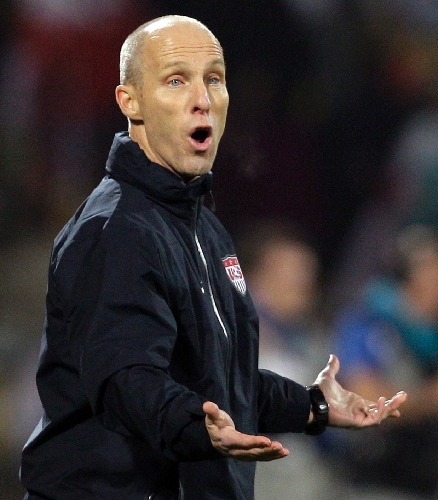Retaining boring Bradley caps U.S. soccer’s ceiling


Jurgen Klinsmann knows soccer. Sure, other German exports have proven more important. Beer. The air bag. The Gummi Bear.
A little something called the Theory of Relativity.
But when news came Monday that Bob Bradley had been retained as U.S. national team coach through the 2014 World Cup, Klinsmann’s words about everything that is wrong with the sport in America rang loud enough to wake most coma-induced patients, which is pretty much the state you find yourself when listening to Bradley talk for more than five seconds.
“You are the only country in the world that has the pyramid upside down,” Klinsmann told reporters during the World Cup in July. “You pay for having your kid play soccer because your goal is not that your kid becomes professional soccer player. Your goal is that the kid gets a scholarship, which is completely opposite from the rest of the world.
“Soccer is very similar to basketball. You need (players) out of the lower-class environment. Soccer worldwide is a lower-class environment sport. We all (came) from very moderate families and fought our way through. You need to keep this hunger throughout your life and get the kids who are really hungry.”
I would not have written this column four years ago because I would not have cared as much. But like many dormant soccer fans throughout the country, I was roused this summer by the U.S. winning its World Cup pool and advancing to the Round of 16.
As a soccer fan in America, I finally was awake.
But it never has been good enough for U.S. soccer to simply win and produce good results. You have to capture the imagination of fans here not intimately linked to the sport.
This isn’t Brazil, where soccer owns a major foothold in the country’s culture, where it is part of the fabric for how people define their lives.
Here, you first must get fans interested, then inspired.
This summer took care of the interest part.
I’m just not inspired, is all.
Bob Bradley couldn’t inspire an evangelist.
“We get a chance to build on everything that has happened over four years,” U.S. Soccer Federation president Sunil Gulati said in announcing the decision to keep Bradley. “Bob has done a great job putting a group of players together, not just in the World Cup. His record speaks for itself.”
That’s the problem. It’s always the problem when talking U.S. soccer.
The national team is like Creighton in college basketball, a nice midmajor that consistently qualifies for the NCAA Tournament but never is a serious contender. It’s not Butler. It’s not getting to a Final Four. It’s not coming a bounce off the rim from cutting down nets.
It’s not winning a World Cup, not coming close, with how we develop players.
Gulati wouldn’t comment on reports he again approached Klinsmann about the job or about why such talks might have broken down as they did in 2006. But this much is certain with Bradley returning: There is a ceiling for how good America can be.
Klinsmann is correct. We put winning and the pursuit of scholarships ahead of nurturing creative, imaginative, technical skill. We even have an Olympic Development Program that charges its players to participate, which often eliminates some of the best young athletes who can’t meet such a financial obligation.
The U.S. advances out of World Cup pool play when the opposition is weak and doesn’t when it’s strong. It advances in 2010 with a pool of England, Algeria and Slovenia but doesn’t win a game in 2006 with a pool of Ghana, Italy and the Czech Republic. It advances in 2002 while playing Portugal, South Korea and Poland but doesn’t in 1998 against Germany, Yugoslavia and Iran.
Same old same old.
Teams reflect their coaches, and while the Princeton graduate Bradley seems a thoughtful, pleasant sort, he also comes off as ultra serious, defensive, cerebral, cautious. Just like his team.
Here is part of Bradley’s answer (boring monologue) when asked what would be new and different and exciting about the national team in the next four years:
“I think that when you watched our team in the last four years, a vision means as a team we take the qualities that we have, our mobility, our athleticism, we combine them with continued attempts to improve our understanding and the way we create chances, the way we pass and move.
“We are a team that continues to improve technically. That shows in the way we pass the ball, create chances. We have to combine those things with a team concept because, again, we’re not yet at the point where our talent level is up with the best teams in the world.”
Inspired yet?
I am. For a nap.
Las Vegas Review-Journal sports columnist Ed Graney can be reached at egraney@reviewjournal.com or 702-383-4618.


















